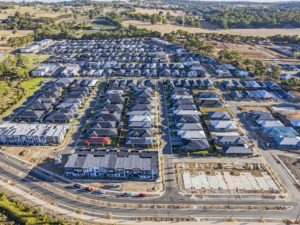News: Australian Cost Of Living At Crisis Point

Pressure is mounting on Australia’s state and federal governments to address the growing cost of living crisis, as millions across the country struggle to keep a roof over their heads.
Ever-rising expenses across the board – fuel, energy, water, groceries, interest rates, rent, childcare etc – have pushed the average Australian to breaking point. Household budgets are stretched thin, and it’s become increasingly difficult to make ends meet week after week.
Community service providers are also strained with growing demand among lower-income earners as costs continue to skyrocket against wages.
So much so, poverty and homelessness are the grim prospects for more and more everyday Australians.
2021 census data recorded 122, 494 Australians experiencing homelessness, an increase of 5.2% since 2016. With the next census not undertaken until 2026, it will be interesting to see how the preceding five years will affect that graph.
But we needn’t await a census to see how dire the situation is; the indicators are everywhere – in our city parks, where families sleep in cars and tents because they can’t afford the rent or mortgage. We see it at work, on the faces of exhausted colleagues who have taken on second jobs just to ward off destitution for another week.
It’s in our supermarkets with the exorbitant cost of staple household items, in our cars with overpriced fuel, and it underpins the ‘side hustle culture’ driving the imperative that we should be working, even when we’re not at work.
The growing desperation is reflected in the latest data from the Queensland Government Statistician’s Office, revealing Australians are spending more on lotteries than ever before. The report, published in October 2023, shows Australians spent more than $7 billion on various lotteries and scratchies in the 2020-21 financial year.
Meanwhile, the Queensland Audit Office reports state gambling losses of $25 billion over the past five years, marked by a steady and significant increase over the years. Queenslanders lost $6.1 billion to gambling in 2022-23, showing a 36% increase from 2018-19. Pokies account for over half (53%) of state gambling losses.
Gambling and addiction are among the key factors that can contribute to someone becoming homelessness.
Yet little is done to curb the power and influence of gaming operators in the state. Advertisements for sports betting apps and international lotteries flood all forms of media – TV, radio, social media and outdoor advertising – further normalising gambling as part of Australian culture when in fact it is a national tragedy.
The Queensland Government made $1.9 billion in gambling taxes last year, only 0.6% of which was spent on funding harm minimisation programs. The Gambling Community Benefit Fund (GCBF) “distributes approximately $60 million each year to not-for-profit community groups,” according to its website. GCBF grants of up to $35, 000 are released in rounds throughout the year to help community groups to enhance the services they provide.
But is it enough to offset the extensive damage gambling causes, and does it really prove any commitment by the Queensland Government to stop cushioning its coffers at the expense of its constituents?
Speaking of taking a punt, taxpayers are being forced to shell out for the Brisbane Olympics set for 2032. The potential boondoggle has already been an expensive venture with Premier Steven Miles rejecting the recommendations of a $450 million report for a new stadium. The 2028 Los Angeles Olympics on the other hand is entirely privately funded through domestic sponsorships, licensing, hospitality, ticketing and the International Olympic Committee. The 2012 Olympics was partly funded by the Olympic Lottery Distributor, resourcing winnings from the National Lottery in the UK.
So, why are Queensland taxpayers footing the bill while gaming operators are making record profits at the expense of our public wellbeing? Surely the money we lose betting on sport should be used to fund the world’s largest sporting event. And when Brisbane presents itself on the world stage in 2032, what is the image we are hoping to project? A first-world capital city with the means to host a global event but that neglects the most basic needs of its own citizens is not an aspirational reputation.
Homelessness is no longer a fringe concern that can be overlooked or swept under the rug; it is a growing epidemic affecting a rising number of Australians across the social spectrum. The real estate market has become untenable for many with soaring rental costs and the cost of owning a home ruling it an unattainable goal. There is also a lack of adequate housing in Queensland owing to a combination of population growth outstripping supply and the growth in Air BnB style accommodation that limits available housing.
Low housing affordability paired with high living costs is a complex problem requiring multiple varying solutions to resolve and provide relief for the people of Queensland.
One proposed solution is to utilise the $220 million Wellcamp quarantine facility in Toowoomba and the Pinkenba COVID camps i.e. Queensland’s Centre for National Resilience as emergency housing. Queensland Housing Minister Meaghan Scanlon is being called upon to open these facilities, but they remain empty.
Queensland’s population is estimated to grow from the current 5.4 million to between 6.4-8.27 million over the next 20 years, according to government data. There are promises for these new Queenslanders to have access to a wide range of housing options. But there is still the question of affordability, and what relief people who are struggling now can expect.
An inquiry into the rising price of groceries is underway with Woolworths and Coles in the spotlight. But there can be no transparency without input from providers across the food chain – from the farmers and growers right through the wholesale and retail sectors. Whether the inquiry bears any relief for everyday consumers is yet to be seen.
In the meantime, we can only work, watch and wait.
Rethink your packaging and transport solutions with MADCAP Global Commodities & Agri-Business.
